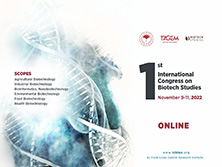Biotech Studies
2017, Vol 26, Num, 3 (Pages: 086-091)
Effectiveness of Co-inoculation of Different Plant Growth-Promoting Rhizobacteria for Improving Nutrients Uptake, Growth, Enzymes Activity and Yield of Tea
2 Atatürk Üniversitesi, Ziraat Fakültesi Bitki Koruma Bölümü, Erzurum
3 Atatürk Üniversitesi, İspir Hamza Polat MYO, İspir, Erzurum
4 Atatürk Üniversitesi, Erzurum MYO, Teknik Programlar Bölümü, Kimya Programı, Erzurum
5 Atatürk Çay ve Bahçe Kültürleri Araştırma Enstitüsü, Rize DOI : 10.21566/tarbitderg.359347 - Tea production in Turkey causes serious problems due to application of chemical fertilizer. For this reason, it is necessary to evaluate the environment-friendly strategies and additional alternative resources that will reduce the need for chemical fertilizers and increase tea production in the Eastern Black Sea Region, where the only agricultural activity is tea growing. The objective of this study was to evaluate possible effects of mineral NPK fertilizer (800 kg ha-1 a compound fertilizer 25:5:10%), one commercial liquid bio-fertilizer and ACC deaminasecontaining, N2-fixing, and P-solubilizing bacteria based bio-fertilizers in triple strains combinations (BFV1: B. subtilis RC521+B. megaterium RC07+P. fluorescens RC77; BFVII: B. subtilis RC11+B. megaterium RC07+P. putida RC06)) on the growth, yield, enzyme activities and nutrient uptake in tea under acidic field conditions in three years. The experiment was arranged as a completely randomized design with five treatments and three replicates (each having five tea bushes). Bio-fertilizer formulations and mineral fertilizer stimulated overall plant growth, including fresh and dry leaf yield, second and third leaf area, macro- and micro-nutrient concentrations chlorophyll and anthocyanin content in tea leaves, and activities of oxidative, catalytic, hydrolytic and antioxidative enzymes of Turkish tea clones Fener-3. In addition, inoculation with bacterial formulation also changed the activities of the enzyme like glutathione reductase (GR), glutathione S-transferase (GST), glucose-6-phosphate dehydrogenase (G6PD), 6-phosphogluconate dehydrogenase (6PGD), polyphenol oxidase (PPO), peroxidase (POD), urease, 5-dehydroshikimate reductase (DHSK), and alcohol dehydrogenases (ADH). This study clearly indicates that the development of stable formulation of plant growth promoting bacteria is of great importance and a promising approach to a sustainable tea agriculture. Keywords : Plant growth promoting rhizobacteria, bio-formulation, yield and quality, enzyme activity, organic farming















